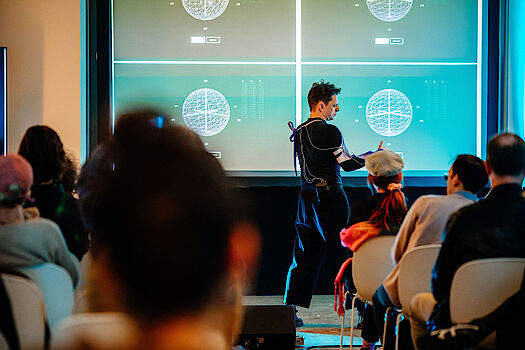On January 30th, 2024, the concert "Quantum Tunes: Mind and Wiggle" held at the Einstein Center Digital Future (ECDF) marked a groundbreaking fusion of music and cutting-edge quantum computing technology. Featuring compositions by Eduardo Reck Miranda and performances by musicians and interactive music researchers, the event showcased the intersection of music, quantum computing, and wearable technology.
The evening began with pre-concert talks and demonstrations, giving guests a glimpse into the innovative research being conducted in the fields of quantum computing and wearable computing. ECDF-Professor Janik Wolters (TU Berlin) kicked off the pre-concert talks with an introduction to quantum light and quantum theory, which was developed by Max Planck in 1900. “What is so special about quantum light? Unlike a classical source, such as a lightbulb, and a laser, quantum light consists of a fixed number of photons. Photons can later be used as qubits which make sounds,“ Wolters explains. His introduction was followed by a talk by Eduardo Reck Miranda, Professor of computer music and director of the University of Plymouth's Interdisciplinary Centre for Computer Music Research (ICCMR). He introduced the concept of using gate-based quantum computing to create music: Computers are ubiquitous in the music industry today. Therefore, it is only natural to assume that new kinds of computers will continue to impact music in the future. I am very interested in championing research in this area“ the composer explains. ECDF-Professor Berit Greinke concluded the pre-concert talks by providing an insight into her research into e-textile wearables, which would later be used during the performance: “The e-textile that my ECDF colleague Federico Visi is using during his performance of Eduardo Miranda’s composition Swirling Qubits is called The Tensile. It is a highly conformable sleeve that has three stretch sensors directly knitted into it, and which can detect gestures made with the arm.”
The concert itself featured two compositions by Eduardo Reck Miranda, each utilizing quantum computing technology in unique ways: bleeps, beeps, and buzzes create sounds turning the evening into a journey through resonance: The first piece, "Zeno 2.0," performed by Carla Rees on alto flute, Fie Schouten on bass clarinet, and Eduardo Reck Miranda and Paulo Itaborai on electronics, featured live interaction between the musicians and an IQM quantum computer based in Finland. AI algorithms running on the quantum computer produced musical material based on quantum mechanical phenomena such as superposition, entanglement, and interference, creating a dynamic and immersive sonic experience. The QuPoly program, developed in collaboration with ICCMR, responded in real time to the performers' inputs, demonstrating the potential of quantum computing to revolutionize musical composition and performance.
In the second composition, "Swirling Qubits," Federico Visi used the textile gestural interface to manipulate sounds generated by Q1Synth, a novel musical instrument that renders sounds from quantum states. By swirling representations of qubits on the screen and measuring quantum states, the performers interacted with music in unexpected ways. The piece showcased the collaboration between ICCMR and the Wearable Computing Group of Berlin University of the Arts and ECDF in the development of new musical interfaces and artistic expression.
"Quantum Tunes: Mind and Wiggle" highlighted the transformative potential of quantum computing and wearable technology in the realm of music. By making use of the power of quantum mechanics, composers and performers are pushing the boundaries of traditional musical expression, creating immersive and interactive experiences that challenge our understanding of sound and composition. “Quantum music will definitely be part of the digital future. We are therefore all the more delighted that this concert with so many wonderful scientists and artists could take place here at the ECDF," says Gesche Joost, Professor of Design Research at the University of the Arts and speaker for the ECDF. As we venture further into the 21st century, the convergence of art and technology promises to reshape the landscape of music, offering new avenues for exploration and creativity.

